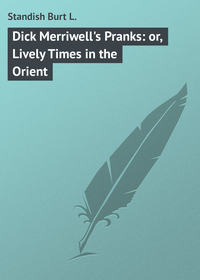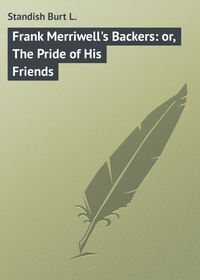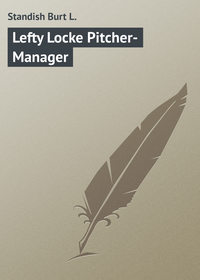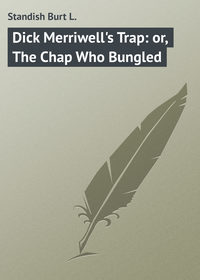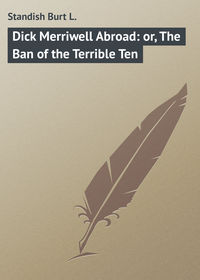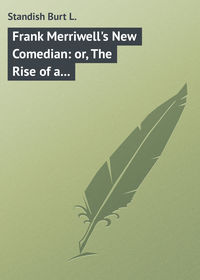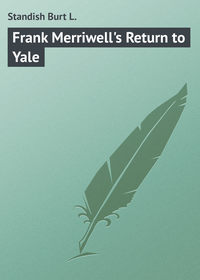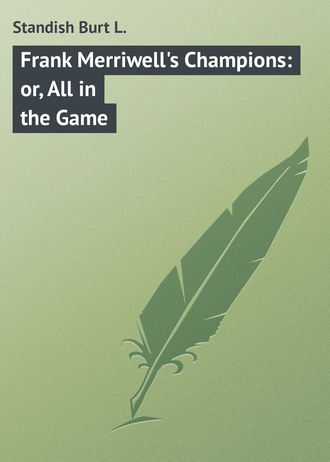 полная версия
полная версияFrank Merriwell's Champions: or, All in the Game
Then, to make sure that the pig could not by any possibility come back to life to frighten him again, he picked up an enormous club, and proceeded to belabor it to such an extent that if there had been any life remaining in the pig’s body, it would have been beaten out.
Having done this, Hans walked around his fallen foe with the victorious air of a conquering hero, uttering exclamations of delight, and figuratively patting himself on the back for his valor.
“Who vos a cowart?” he demanded, squaring his shoulders and striking out at imaginary foes. “I vould bunch mine heat uf you sait nottings like dot, Hans Dunnerwust, you vos der pinking uf vighting mans dis moindain on, und don’d let dot vorget me! I pet him you vos der beacherino uf der Lilywhites!”
Then, still strutting like a peacock, he threw the dead pig over his shoulders, picked up his alpinstock, and marched along the path like a high-stepping horse.
From the top of the bluff, where his friends had found their way seemingly blocked, he heard voices calling to him – the voices of Harry Rattleton and Jack Diamond, who had turned back to search for him.
Hans answered, with a squeak of delight.
“See dot!” he cried, taking the pig from his shoulders and holding it above his head. “Dot vos a vilt hock vot kilt me ven I dried to ead him ub! I vos a fighder, I tolt you, ven I ged him starded!”
It was with the utmost difficulty that Ward Hammond concealed his intense chagrin and bitter hate when he arrived with his companions at the goal of the mountain-climbing race and found that Frank Merriwell’s party had beaten them by more than thirty minutes.
“It’s all right,” he said, with a sickly smile. “Though I do think you fellows must have had wings hidden about you to get here so soon. But wings weren’t barred. Of course, we wanted to win, but we didn’t, and that’s all there is to it.”
While he was talking, old Bob Thornton, carrying the long rifle that Sam Turner had taken from its peg in the cabin, was creeping through the laurel and over the vines toward a point of rocks that commanded a view of the path by which he was sure Merriwell and his friends would descend from the mountains.
He did not try to conceal his bitter hate, as Hammond was doing. His mind was inflamed with the angriest of passions, for Hammond had made him believe that the mountain climb was an excuse on the part of Merriwell to get into these hills, where Thornton’s little copper still, for making liquor, lay hidden.
The ravine that held it was less than a mile from the top of Bald Mountain, in a wild and almost inaccessible gorge, and he was fairly shaking with the fear that Merriwell had spotted the gorge from the mountain’s top, and would try to enter it later in the day.
“He’ll never hunt anuther still ef I git a good crack at him!” the mountaineer growled. “The guv’ment’s got ter be larnt that it jes’ ain’t ary bit o’ use to send revnoo spies peekin’ ’roun’ hyar. We uns o’ Bald Mounting won’t stan’ it!”
Ward Hammond dissembled with considerable skill. He laughed, joked and praised the climbing of the members of the Lake Lily Club, all the while wondering if Bob Thornton would try the shot he threatened, and hoping that the bullet would at least maim Merriwell for life.
Hammond held by inheritance from these rude mountaineers the fierce hate that made them such a terror to their foes, and caused among them such bloody feuds. In him Frank Merriwell had an enemy to be feared.
He had a purpose in playing a friendly part that day, and in staying with Frank’s party. He fancied that if Merriwell should be killed by a shot sent from the woods by an unseen hand, he might be suspected as the shooter, which could not be the case if he remained at Merriwell’s side.
“Hammond doesn’t seem so bitter as we’ve been led to believe,” declared Rattleton, speaking to Bart Hodge. “Perhaps he’s been painted a good deal blacker than he really is.”
“I hope so,” said Hodge, who more than once had been made uneasy by the accounts given by Colson and others of Hammond’s fire-eating and unforgiving spirit. “He seems pleasant enough to-day, at any rate.”
Without a thought of danger, Frank descended the mountain path, laughing and joking.
Bob Thornton was still stealing through the bushes, with the long rifle in the hollow of his arm.
But there was another stealing after him, with bated breath and shining eyes. Nell Thornton, his daughter, who, having observed his movements, suspected his evil intentions, and was now following to thwart them if she could.
When he reached the rocky point, from which he expected to send the shot, and from which he could dive into a jungly growth that would protect him from view and pursuit, Nell was close at his heels, though he was still unaware of it.
His face darkened as he dropped the rifle out of the hollow of his arm and inspected the percussion cap, when Merriwell and the others came into view around a bend in the path.
“He’ll never hunt anuther moonshiner!” Thornton grated, through his set teeth. “He’d better be a-sayin’ of his prayers when I pull down on him with this ole Bet!”
Nell heard the grated threat, and shivered, but the look of determination grew in her white, thin face and shone brighter in her glittering eyes.
Thornton waited until the party was near enough to make the shot safe, but still far enough off to enable him to plunge into the undergrowth and lose himself to pursuit before any one could reach him.
Then he threw the long rifle to his cheek, ran his eyes down the brown barrel, and covered Frank Merriwell’s heart with the sights. Though his eyes were blazing, his muscles seemed as steady as iron.
The finger pressed the trigger, and there was a whip-like report.
But the bullet did not reach Frank Merriwell!
Just as Thornton’s finger pressed on the trigger, Nell leaped from the bushes that screened her and caught at his arm, thrusting the rifle aside.
With a shriek, Ward Hammond threw up his arms and dropped to the ground.
The bullet intended for Merriwell had lodged in the body of his enemy.
CHAPTER X – NELL’S LETTER
“How is Hammond this morning?” Frank anxiously asked of Browning, whom he joined near the boathouse. “Have the doctors found the bullet yet?”
Bruce had just come from the village, whither he had gone to make inquiry concerning Hammond’s condition.
“Yes,” he answered, as they walked together toward the cottage. “They extracted it this morning. It struck a rib, and the wound isn’t as bad as it might be. He’ll be laid up for a time, they say. There is no question but that he’ll get well.”
“I’m glad to hear it,” was Frank’s sincere rejoinder. “I thought he was a goner when I saw him drop near me at the crack of that gun.”
“Hello! what’s this?” Bruce exclaimed, a moment later, as they entered his room.
He stepped quickly to the little table, and took up a bunch of flowers, to which was tied a note, oddly scrawled and spelled.
It was from Nell Thornton, and this is what it said:
“I am ergoin’ ter slip in an’ put these on yer table, ’ca’se I hav’ heern that grand folks like ’em, an’ leeve this letter ’bout dad, ’ca’se I thot mebbe ez how you uns would want ter knowl. He hez knocked a hole in his ole still, an’ is ergoin’ ter leeve these mountings, he sez, an’ try ter be ’spectable. So good-by. I node frum the fust thet you warnt no revnoo.
“Frum your fr’end furever,“Nell Thornton.”“She’s an all-right girl,” said Bruce, after a pause, “even if she is rather awkward.”
“Bedad, we had better be gittin’ out av the mountains before some more shootin’ takes place,” put in Barney.
“That’s right,” came from Harry. “One shot like that is enough.”
But the boys lingered for several days, and during that time their newly made friends did all possible to make the stay a pleasant one.
“We won’t forget you Yale boys!” cried one, on parting. “Let us hear from you, by all means.”
“Ve vill,” said Hans. “Put don’t neffer oxbect me to kill some more piks py mineselluf again alretty!”
There was a gay time at the parting, for a crowd had come to see them off as far as the railroad station.
It had been decided to make their way eastward to the Potomac River, for Diamond wanted to show his friends that beautiful stream of water.
“I’ve sailed on the Potomac many times when at home,” said the Virginian. “And I want to give you boys a sail, too.”
“All right – anything to take it easy,” sighed Bruce. “That mountain climbing was work enough to last a month.”
The ride in the train was enjoyed by all, and as they passed eastward, mile after mile, Diamond pointed out many objects of interest.
At last they reached the station to which their wheels had been sent, and here they left the train.
“There is an easy road along here,” said Jack. “I know you will all delight in a spin.”
Bruce groaned.
“More work – and just as I was getting so comfortably settled in that car seat, too.”
“Oh, brace up, Bruce!” cried Frank, cheerfully. “You’ve done well ever since we left New York. Don’t collapse on the last lap.”
“All right; I’ll brace up,” sighed the big fellow, and followed the others.
Toots had seen to it that the bicycles were polished to the last degree, so that they shone like silver in the bright sunshine.
For over an hour the crowd spun along over the road.
Then unlucky Hans ran into a hollow, throwing himself over the handle bars and twisting one of the pedals of his machine.
Luckily, there was a repair shop not very far off, and to this they took their way, where a machinist went to work on the wheel without delay.
While the others were waiting for Hans’ bicycle to be mended, Diamond called Frank to one side.
“Come down to the river with me,” he said. “I want to show you a particularly fine view.”
“How far?” asked Frank.
“Only about half a mile.”
“All right, I’ll go with you.”
And the two set off, never dreaming of the tremendous surprise in store for them.
CHAPTER XI – A TRAITOR AND A SPY
“Steady! steady!” roared a commanding voice. “Stroke, keep at it, and pick it up quicker on the beginning.”
The eight oarsmen in the boat were doing their level best, their oars flashing in the sunlight as they came dripping from the water to disappear again, sending the light craft flying along.
On the shore, which at this point was a high bank, the coach watched them as they skimmed past, and shouted his commands.
“Drive your legs at it, four! What are you in the boat for? Carry it through all the way. Up, now! Long swing! Great Scott! don’t think you’ve got to break your neck to recover because you pull hard on the stroke.”
He was a young fellow with a beardless face that plainly indicated his firm conviction that what he did not know was not worth finding out. His lips were red and full, and his entire bearing plainly betokened unlimited self-conceit.
He was dressed in a flannel outing suit, and wore a straw hat, about which was a bright red ribbon. His necktie, also, was bright red. On his feet were well-polished russet shoes. There was a diamond in his tie, and diamonds set in the rings on his fingers.
It seemed at a glance that this lad had “money to burn.” His swell appearance was enough to make almost any ordinary boy regard him with envy and admiration. And his manner would impress an ordinary boy with his astonishing knowledge and importance in the world.
“Oh, say!” he shouted; “what do you chaps think you are doing? Feel for the water. Be delicate and gentle when you are coming forward. This is not a question of bull strength. If it was, a crew of longshoremen and freight handlers could row all around you.”
Not a word from the sturdy, sun-browned young fellows in the boat. They were there to obey, and to stand such abuse as this insolent, overbearing coach saw fit to heap upon them.
“Great Scott!” cried the coach, once more. “You chaps make me sick! Will you never get onto yourselves? There you go, five! Can’t you see what you’re doing? You’re pulling out, and you are wasting the end of your stroke. You are finishing ahead of four every time. It would take a club to beat anything into your head! Vast, turn around, coxswain.”
Then this important person fell back a step, and spoke to another lad, who was concealed by some bushes, from which he was peering at the crew in the boat.
“A lot of lubbers,” said the coach, contemptuously. “You fellows needn’t worry about them. You’ll show them clear water from the start.”
These words were uttered in a low tone, so they could not be heard by the rowers.
The boy hidden in the bushes laughed softly.
“You are playing them for suckers, all right, Harlow,” he said; “but it does seem to me that they are improving under your coaching. Look out and not make them so good that they will stand a show of winning over A. A. C.”
“If they didn’t improve, they wouldn’t keep me as coach,” returned the other; “but I’ll knock the stuffing out of them at the last moment by advising the removal of a good man and the substitution of a poor one. I want them to have enough confidence in me by that time so they will do exactly as I say.”
Two other lads, in bicycle suits, unseen by the treacherous coach and the spy in the bushes, having left their wheels near the highway that ran some distance from the river, had come down and stopped near enough to hear all this conversation.
They were Diamond and Frank.
Diamond had brought Merriwell to that point in order to show him the pretty view of the Potomac River, and not till they had advanced more than two-thirds the distance from the road did they hear the shouted cries of the coach, and see him standing on the bluff.
The curiosity of the boys was aroused, and they came forward quietly to see what was taking place.
The coach, and the spy in the bushes, were so absorbed in the movements of the crew that neither saw Merriwell and Diamond, and so, without thinking of playing eavesdroppers, the Yale lads heard something that was not intended for their ears.
Jack clutched Frank’s arm.
“What do you think of that?” he hissed, his dark face growing still darker.
“Think,” said Frank, scornfully. “I think that coach should be ducked in the river!”
“And I think the spy should be ducked with him!” came fiercely from the lips of the young Virginian.
“Look here, Jack!” said Frank, “there is something familiar about that fellow in flannels. I’ve seen him before.”
“His voice sounded familiar to me,” nodded Diamond.
At this moment, as if he had heard their voices, the coach looked in their direction, and saw them. He gave a violent start, seemed a bit confused, and then cried:
“What are you doing there – playing the spy? Don’t you know you have no right there?”
In another instant Frank was bounding toward the spot, followed by Jack.
“No, we are not spying,” said Merriwell, “but we know a chap that is! Here he is!”
Then he pounced on the startled youth in the bushes and dragged him forth, for all of his resistance.
“Let me go, hang you!” came from the fellow Frank had exposed. “If you don’t let me go, you will be sorry!”
“I’ll let you go when I have shown you to the gentlemen in that boat down there,” declared Frank. “I have dealt with sneaks like you before.”
The spy struggled desperately, furious at the thought of exposure and disgrace.
“You shall suffer for this!” he grated.
Then the coach advanced quickly on Merriwell, speaking in a low tone, although his voice quivered with passion:
“Let him go – let him go! If you don’t – ”
“What then?” said Jack Diamond, placing himself in the path of the treacherous coach. “What do you think you will do about it, my fine fellow?”
“I will – Great Scott! It is Jack Diamond!”
The coach staggered from the shock of the discovery, for up to that moment he had been too excited to recognize either of the boys. Now he looked at the other, adding, hoarsely:
“And that’s Frank Merriwell! Satan take the luck!”
This attracted Frank’s attention, so he turned and took a square look at the coach, in whose appearance he had fancied there was something familiar from the very first.
“Great Jove!” he cried. “Rolf Harlow!”
The name and the sight of its owner awakened a host of unpleasant memories in Frank’s heart.
Harlow, expelled from Harvard for gambling and cheating at cards, had come to New Haven in search of “suckers” among the Yale students. He had been introduced by a student by the name of Harris, and Frank, whose one great failing was his strong inclination to play cards for a stake, had been drawn into the game in his endeavor to pull Rattleton out of it.
In the end it had proved fortunate that Frank was led into the game, for he had detected Harlow in his crooked dealing and exposed him, compelling him to give up certain of Diamond’s promises to pay, and thus saving Jack from disgrace.
Harlow was revengeful, and he had tried to “get square” with Frank, but each attempt had rebounded disastrously upon him. When last seen, Rolf was following a circus through the State of Missouri, and working a shell game on the country people.
Now he was in Virginia, coaching a crew of oarsmen who were practicing for a race!
And, as usual, he was playing a crooked game.
The crew in the boat saw the struggle on the shore, and wondered what it meant. There was a landing near, and toward it the coxswain directed the boat, saying:
“Pull, fellows! We must go up there and investigate this affair. We have been watched.”
Harlow turned very pale when he recognized Frank, for he had learned to fear our hero. He had not dreamed they would meet in Virginia.
As soon as Diamond could recover from the astonishment of the discovery, he scornfully cried:
“Harlow it is, and he is up to his old tricks!”
The spy, whom Frank had captured, made a savage attempt to thrust Merriwell from the edge of the bluff into the river, seeing the crew was coming, and he soon would be face to face with a lot of angry lads who might not have any mercy on him.
“Easy, my fine chap!” laughed the Yale athlete. “What’s the use! You can’t do it, you know!”
“Help, Harlow!” appealed the spy. “The Blue Cove fellows are coming, and they’ll be awfully mad!”
Harlow hesitated, and then a desperate light came into his eyes. Young ruffian that he was, he always went armed, and now he decided to make an attempt to bluff Frank.
With a quick movement, Rolf produced a revolver, which he pointed straight at Merriwell, crying:
“Let him go – let him go, or I’ll shoot!”
The expression on his face seemed to indicate that he really meant it, and Diamond shivered a bit, knowing Harlow as he did, and thinking him desperate and reckless enough to do almost anything in a burst of passion.
Jack crouched to move aside, so he could spring at Rolf, but Harlow saw the movement, and hissed:
“Stand still there, or I’ll shoot you first!”
“You don’t dare – ” began Jack.
“Don’t I?” interrupted the desperate lad with the revolver. “You’ll find I do! I’ve been jumped on by you fellows till I can’t stand any more of it! This is a case of self-defense, and I can prove it so. You attacked us! I have a right to defend my life!”
It was plain that Harlow was trying to convince himself that he was in the right, and, could he do so, hating Frank Merriwell as he did, it was certain that he might shoot on the slightest provocation.
Jack stood still; for the moment he knew not what to do.
“Come here, Diamond,” called Frank, sharply. “Come quick! Don’t mind that fellow! If he does any shooting, I won’t leave much of a job for the lynchers! I believe they string people up down in this State in a hurry!”
“Stand where you are, Diamond!” shouted Harlow.
But Jack obeyed Frank, and Harlow did not shoot.
“Now, hold this spy, and I will deal with that crook,” said Frank, turning the lad he had captured over to Jack.
As soon as he had done this, Merriwell started to walk straight toward Harlow, who still had him covered with the revolver.
“Stop!” shouted Rolf, fiercely; “stop! or by the Lord Harry, I will shoot!”
“Oh, no, you won’t,” answered Merriwell, with the utmost confidence, as he calmly continued to advance, apparently as unconcerned as if it were a toy pistol in the hand of his enemy.
Harlow hesitated, and gasped. Reckless though he was, intensely though he hated Frank, he had not the nerve to shoot the cool lad down.
Through Harlow’s head flashed a thought. What if he should pull the trigger, and the revolver failed to go off? He knew Merriwell would be on him like a furious tiger. He knew Merriwell would have no mercy.
He dared not try to shoot. The eyes of the Yale athlete were fastened steadily upon him, and there was something in their depths that made him falter.
One, two, three seconds, and then Frank’s hand grasped the revolver and firmly turned it aside. Harlow seemed incapable of resistance, and, to his own astonishment, as well as to the unutterable amazement of the witnesses of the act, Frank took the revolver away without being resisted.
Diamond was paralyzed by the nerve of his friend. Although he had known Frank long, and thought he knew him fully, this act was a revelation to him.
Then it was, while Diamond was staring and muttering, that the spy suddenly struck him a terrific blow behind the ear, sending Jack to grass.
For an instant Diamond was stunned, and when he recovered, the spy was far away, running as if his very life depended on it.
Jack scrambled up as quickly as he could, and would have followed, but Frank called:
“Let him go! It’s useless to chase him.”
“Well, that was a fool trick of mine!” growled the Virginian, disgusted with himself. “I ought to have a leather medal!”
The boat’s crew had made a landing, and now they came toward the spot on a run. Handsome, manly young chaps, from sixteen to nineteen, they were.
“Genuine Virginians, they are!” muttered Jack, admiringly. “They don’t grow anything better anywhere!”
Harlow seemed cowed by what had taken place.
Since being disarmed without a struggle, all the spirit seemed to have left him. He stood still, looking sullen and uncertain, as if not quite sure what to do.
Up came the oarsmen, a solid-looking, brown-eyed lad in the lead.
“What’s all this about, anyway?” he sharply asked, addressing Rolf. “Who are these chaps, and what are they doing?”
An idea came to Harlow; he grasped at it.
“They are spies – enemies!” he quickly declared. “They were watching here in the bushes. They must be connected with the Alexandria fellows.”
Then the rowers, sunburned and brawny appearing, gathered about Frank and Jack, regarding them with anything but pleasant looks.
“Give it to ’em!” shouted Harlow, hoping to set the boys on Frank and Jack before any explanation could be made. “See here – don’t you see one of them threatening me with a revolver? They are desperadoes!”
“In that case, gentlemen, perhaps it would be well enough not to push us too hard,” coolly observed Frank, as he moved the muzzle of the revolver about in a careless manner. “Just give us time to say something for ourselves.”
“Don’t listen!” cried Rolf, wildly. “They will try to lie out of it, but I saw them spying!”
“Who was the chap that ran away?” asked the leader of the oarsmen, the stroke, whose name was Kent Spencer.
“He was one of them,” asserted Harlow.
“In that case, it is odd we didn’t run away with him,” smiled Frank. “We might have done so, you know.”
“Well, why didn’t you?” asked Spencer.
“Because there was no reason why we should run, and several reasons why we should stay. We can tell you a few things that may surprise you.”
“Don’t listen to their lies!” shouted Harlow. “Pitch them into the river! It’s what they deserve!”
For a moment it seemed that the young oarsmen would obey him. They seemed about to precipitate themselves on the strangers. Again Frank’s coolness caused a delay.
“If you want to souse us in the river after we have made our explanation, you can do so,” he smiled; “but isn’t it well enough to hear what we have to say first?”
“I don’t see that it can do any harm,” admitted Spencer. “Give the fellows a show, boys, but don’t let ’em get away.”


